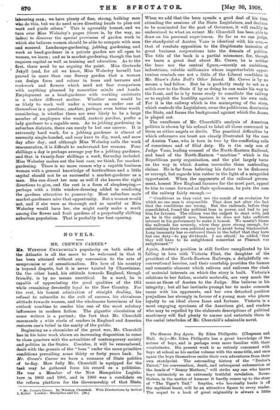NOVELS.
MR. CREWE'S CAREER.* Ms. WINSTON CHURCHILI:E1 popularity on both sides of the Atlantic is all the more to be welcomed in that it has been attained without any concession to the arts of compromise or of sensationalism. His love of his country is beyond dispute, but it is never tainted by Chauvinism. On the other band, his attitude towards England, though friendly, is by no means uncritical. In a word, he is capable of appreciating the good qualities of the Old while remaining devotedly loyal to the New Country. For the rest, his honest admiration of straight dealing, his refusal to subscribe to the cult of success, his chivalrous attitude towards women, and the wholesome breeziness of his outlook combine to render him one of the most salutary influences in modern fiction. The gigantic circulation of some writers is a portent; the fact that Mr. Churchill commands a wide circle of readers in England and America restores one's belief in the sanity of the public.
Beginning as a chronicler of the great war, Mr. Churchill has in his later work shown an increasing disposition to come to close quarters with the actualities of contemporary society and politics in the States. Coniston, it will be remembered, dealt with the genesis of the " boss " under the more primitive conditions prevailing some thirty or forty years back. In Hr. Crewe's Career we have a romance of State politics of to-day. How fully Mr. Churchill is equipped for the task may be gathered from his record as a politician. He was a Member of the New Hampshire Legisla- ture in 1903 and 1905, and in 1906 was a candidate on the reform platform for the Governorship of that State.
• Mr. Cremes Career. By Williston Churchill. With Illustrations by Arthur L Keller. London : Macmillan and Co. [6...1
When we add that the hero spends a good deal of his time attending the sessions of the State Legislature, and declines. to be nominated for the post. of Governor, it will readily be
understood to what an extent Mr. Churchill has been able to draw on his personal experiences. So far as we can judge, the standpoint of Austen Vane is identical with his own,— that of resolute opposition to the illegitimate incursion of great business corporations into the ,domain of pelities. The title of the book is a partial misnomer, for, though we learn a great deal about Mr. Crewe, he is neither the hero nor the central figure,—merely an ambitious, industrious, voluble millionaire whose imperturbable oppor-
tunism reminds one not a little of the Liberal candidate in Mr. Shaw's John Bull's Other Island. Mr. Crewe is by no means a bad fellow. But he is perfectly ready to act as a milch-cow to the State if by so doing he can make his way to
the front, and he is by turns ready to conciliate the railway or to exploit the hostility against it to serve his own ends.
For it is the railway which is the mainspring of the story, which controls the Legislature, owns the politicians, dominates the State, and forms the background against which the drama is played out.
The excellence of Mr. Churchill's analysis of American politics is shown by his refusal to label all those concerned in them as either angels or devils. The practical difficulties by which reformers are beset are clearly illustrated by the case of Austen Vane, who is torn in two by the conflicting calls of conscience and of filial duty. He is the only son of Judge Vane, leading counsel of the North-Eastern Railroad, and head of the North-Eastern " machine " which is the Republican party organisation, and the plot largely turns on the way in which Austen reconciles these contending. claims. He is far from believing his father to be dishonest or corrupt, but regards him rather in the light of a misguided opportunist. When the opponents of the railroad govern- ment, honest New England farmers for the most part, appeal to him to come forward as their spokesman, he puts the case of the railway fairly enough :— " 'Conditions as they exist are the result of an evolution for which no one man is responsible. That does not alter the fact that the conditions are wrong. But the railroads, before they consolidated, found the political boss in power, and had to pay him for favours. The citizen was the culprit to start with, just as he is the culprit now, because he does not take sufficient, interest in his government to make it honest. We mustn't blame the railroads too severely, when they grew strong enough, for substituting their own political army to avoid being blackmailed. Long immunity has re-enforced them in the belief that they have but one duty—to pay dividends. I am afraid,' he added, that they will have to be enlightened somewhat as Pharaoh was enlightened."
Again, Austen's position is still further complicated by his falling in love with Victoria Flint, the daughter of the president of the North-Eastern Railways, a delightfully un- conventional heroine, and their courtship provides the human and romantic element which relieves and enlivens the clash
of material interests on which the story is built. Victoria's relations to her father, mutatis mutandis, are very much the same as those of Austen to the Judge. She believes in his
integrity ; but all her instincts prompt her to make common cause with his opponents, and her own detached position prejudices her strongly in favour of a young man who places loyalty to an ideal above fame and fortune. Victoria is a most engaging specimen of the American girl, and readers who may be repelled by the elaborate descriptions of political machinery will find plenty to amuse and entertain them in the social interludes of Mr. Churchill's admirable novel.






































 Previous page
Previous page